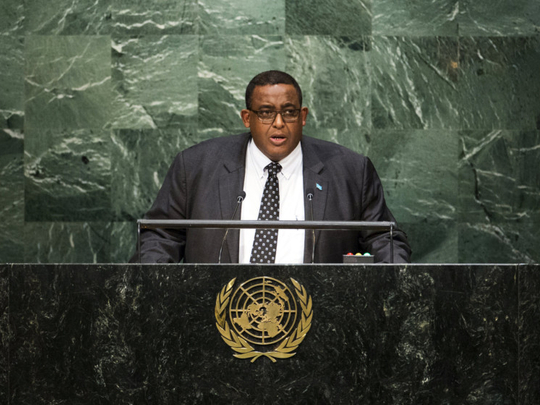
United Nations: Somalia’s prime minister said Friday the government wants to liberate all remaining territory held by the Islamist militant group Al Shabab in the coming year and have its own forces take over the country’s security from an African Union force in the next two to three years.
Omar Sharmarke said in an interview with The Associated Press that he believes both goals are achievable.
Somalia has been trying to rebuild after establishing its first functioning central government since 1991, when warlords overthrew a longtime dictator and turned on each other, plunging the impoverished nation into chaos. Al Shabab militants were ousted from the capital, Mogadishu, in 2011 and have been pushed out of other key cities but they are not yet defeated and the government remains weak.
Sharmarke said Al Shabab “has lost a lot of ground” though they still pose a threat especially in rural areas where they still operate. But compared to other hotspots like Iraq and Afghanistan, he said, “we are the only country that consistently has decreased this radicalization.”
The prime minister said Al Shabab now carries out a major attack every two to three months, like the suicide bombing at the gate of Somalia’s presidential palace on Sept. 21, usually when they lose ground to show that they’re still viable and to attract young recruits. By contrast, in countries like Iraq and Afghanistan, there are sometimes several attacks a day, he said.
“So I think we really have moved the ground out of a dark ... period, and moved really much more in a positive kind of environment,” he said.
Sharmarke said Somali and AU troops have successfully pushed Al Shabab extremists from all the towns they controlled along the Indian Ocean, which has hurt the militants’ efforts to maintain a parallel economy, and they are now pressing the fight to other areas Al Shabab controls to contain and defeat the “radical insurgency.”
“In the coming months, through this year, and beyond, we want to liberate all the remaining ... areas which they occupy now,” he said. “It is an achievable goal.”
Militarily, Sharmarke said, the government is also trying to build up and train its military, with help from Britain and the United States, so it can gradually take over all security from the AU force.
Somalia does not want the African troops to be replaced by a UN peacekeeping force, which has been a long-term goal in Security Council resolutions, he said.
“I think in the coming two to three years, we tend to take (over) everything,” Sharmarke said.
At the same time, he said, the government is trying to fight the radical ideology that attracts the extremists through the media, local governments and religious leaders.
Somalia is “trying to reach out to the maximum audience, and it’s also evident now that people have moved away from that ideology,” Sharmarke said, citing the diminishing support for Al Shabab.
It is also working with neighboring countries including Kenya, Uganda and Ethiopia, where extremists are also being recruited, on a plan to share intelligence - “and actionable intelligence,” he said.
The prime minister stressed that strengthening the military and building the economy must go hand in hand.
In his speech Thursday to the General Assembly’s annual ministerial meeting, Sharmarke proposed a “Grand Development Plan” for Somalia focused on rebuilding roads, schools, hospitals, community centers, ports, airports, and markets.
He said he is now following up with potential donors, stressing Somalia’s important geopolitical location on both the Gulf of Aden and the Indian Ocean and seismic data showing huge untapped reserves of both oil and gas.












